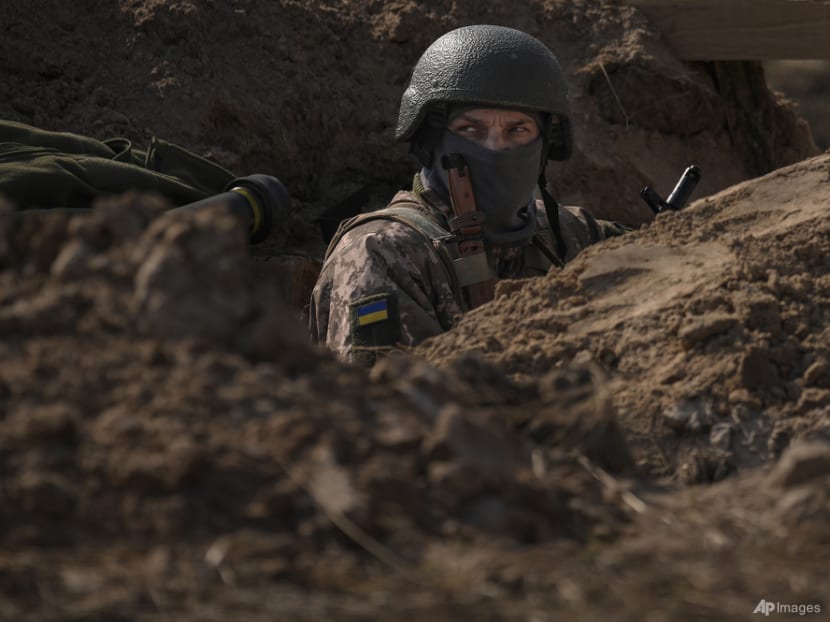As Ukraine-Russia conflict rages on, people in Singapore caught in its information war

A Ukrainian soldier stands in a trench at a position north of the capital Kyiv, Ukraine, on Mar 29, 2022. (Photo: AP/Vadim Ghirda)
SINGAPORE: While the ground war rages on in Ukraine, the information war around the conflict has spread around the world, including to Singapore.
Varying narratives about the war show up in videos, social media posts and memes, and are shared on messaging apps like Telegram. Online battles about whether Russia is the aggressor or felt it had no choice in its invasion of Ukraine are waged among keyboard warriors.
Mr Jack Wong, 61, does not condone Russia’s invasion but thinks that there’s more than meets the eye as he believes many official sources of information only focus on the Western perspective.
“I see a lot of things reported on Western media that are basically, to me, a reproduction of US foreign policy agenda,” he told CNA.
This is why he shares online videos which show an alternative view - “to balance the issue to let people see both sides of the road before they cross, don't just look at one side”, he said.
CNA reached out to a number of people who posted their views and shared content supporting Ukraine or Russia, but many did not want to have their real names published.
One online commentator said he doubted a viral video of Ukrainian President Volodymyr Zelenskyy in which the president reassured Ukrainians that he was in Kyiv and had not fled as rumoured.
“Who can really confirm that he is still staying?” he told CNA, adding that the “backdrop looks fake”. He declined to give his real name, saying: “This is a touchy topic even in Singapore. I don’t want to be seen outright being a Putin supporter.”
CLASH OF VIEWS ONLINE
Netizens like these often get rebuttals to their posts almost immediately, by others holding different views and who warn them not to fall for Russia’s “sophisticated influence operations”.
Dr Carol Soon, senior research fellow at the Institute of Policy Studies, said that the transboundary nature of cyberspace means that all local or regional conflicts now have the potential to reach an international audience.
“The debates that the Ukraine-Russian war have sparked demonstrate how challenging it is for any government to craft and maintain a specific narrative,” said Dr Soon.
“This is evident in how different media outlets, civil society groups and communities all around the world interpret, frame and reframe the ongoing war."
DISCERNING BETWEEN REAL AND FAKE IS "TRICKY"
She pointed out that the information war is not the outcome of a disinformation campaign that was launched overnight or when the war began in February.
“It is the culmination and build-up of years of hostile information campaigns. Russia’s persistent disinformation tactics to undermine political and civic discourse in Ukraine in the past years have been well-studied and documented,” she said.
Among the narratives pushed out by Russia are that the invasion is a “special military operation” to demilitarise and "denazify" Ukraine, that Ukraine was planning to use chemical weapons against separatists and that there is genocide in Ukraine.
Professor of politics Chong Ja Ian said that from the lead-up to the invasion, there has been an increase in Russian and Russian-related claims about the threat that Ukraine and NATO pose to Russia. At the same time, there have been Ukrainian and Western efforts to debunk these claims.
Related:
Discerning what information is real and what is fake is “tricky”, Dr Chong said, adding that successful disinformation often intentionally includes “kernels of truth to create plausibility or to mislead”.
“Often, useful ways to gauge information is to maintain a healthy scepticism and seek independent corroboration,” said Dr Chong.
“The downside is that absent independent fact-checking tools, more transparency and better media literacy, such attempts may take time and effort that people are less willing or able to devote to the issue at hand.”
He observed that for places with existing anti-American and anti-European sentiment, some of the Russian and pro-Russian narratives about NATO and/or Ukrainian threats are likely to find more traction.
“Singapore and the region will have to face this more contested information environment,” he said.
“That Singapore does not have a direct stake in the conflict also means that people may be less careful in how they treat the information they receive about the conflict.”







